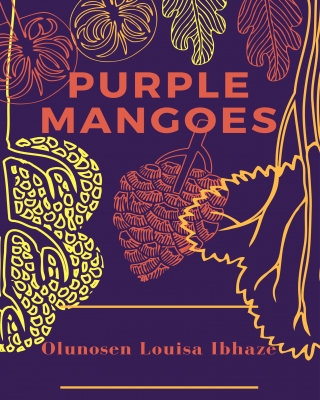Features
#LiterallyWhatsHot: “Not Masterfully Crafted, But Relatable” – A Review of Olunosen Louisa’s Ibhaze’s Purple Mangoes
“I had peeped and saw my sister being held down firmly by two older women with her legs spread apart, also held firmly…I would never forget the scream from my sister’s young lungs as the old woman lifted her bloody hands and dipped them into the bowl of water beside her to rinse the blood off. That was the same bowl she had used for the first three girls she had cut.”
In the last few decades, more art has sprung up depicting the struggles of women in modern African society. There have been tons and tons of essays, novels, poetry volumes and plays, but truth be told, there is no such thing as “talking too much” about the battles that the female gender faces daily, from homes to workplaces, buses to malls. The problems that threaten to choke women still linger, and until they disappear, we must keep stressing and emphasizing.
Olunosen Louisa Ibhaze , a writer who loves telling stories about gender issues and women’s social and cultural experiences, has been published in African Writer, Naija Stories and The Voices Project. She is the author of the novels “Truly” (2005) and “Authentic Mama” (2016) as well as the poetry collection “Winds Of My Sahara” (2017).
 Her recent offering, “Purple Mangoes”, is a collection of ten short stories which highlight various realities surrounding the Nigerian female. Delivered in short bites, they point out the things that Ibhaze can’t seem to stop talking about. The book opens with “Letter To My Child”, a missive containing the hopes and expectations of an expectant mother. “The Child Widow” highlights the perils of Child Marriage, “He Promised” is the story of a nagging wife whose husband’s demise causes her to mull over what would have been, “The Rite Of Passage” dwells on female genital mutilation, and “Abiku” has to do with the superstition that is triggered by continual loss of children to sickle cell anaemia.
Her recent offering, “Purple Mangoes”, is a collection of ten short stories which highlight various realities surrounding the Nigerian female. Delivered in short bites, they point out the things that Ibhaze can’t seem to stop talking about. The book opens with “Letter To My Child”, a missive containing the hopes and expectations of an expectant mother. “The Child Widow” highlights the perils of Child Marriage, “He Promised” is the story of a nagging wife whose husband’s demise causes her to mull over what would have been, “The Rite Of Passage” dwells on female genital mutilation, and “Abiku” has to do with the superstition that is triggered by continual loss of children to sickle cell anaemia.
“Baby Girl” sheds light on the respect (or lack thereof) accorded to the girl child from birth, “Bed” shows the intricacies of wedding night demands across three generations, “Witch Child” is an expose on child witchcraft allegations and the ordeals of accused children, “He Had Fallen And Died” is a piece centred around domestic violence and marital infidelity, and in the concluding story, “Hospital Business”, a teenager is flung into the world of human trafficking and prostitution in Europe.
The author’s intention is made clear from the title of the book, which is as suggestive as it gets, depicting women’s breasts. Each story comes with female protagonists, and while this suggests a feminist agenda of sorts, it is by no means a negative thing; whoever doesn’t like her characterisation can go write their own stories! The themes are dark, the descriptions graphic, and while this is not quite Lesley Nneka Arimah’s “What It Means When A Man Falls From The Sky”, the themes addressed her are definitely relevant.
This prose collection, however, won’t get that many marks when it comes to the storytelling. There are lots of clichés, the conclusions are largely predictable, the transition in events leaves much to be desired, and a lot more dialogue would have been nice. Cynics will toss this aside, and in this day and age where there is emphasis on narrative language and style, this book sadly falls short, with the pedestrian nature of most of the stories here. There are a number of typographical errors too, and for a 2017 literary offering, the diction is too prudish; use the words “sex” and “vagina”, use them for Pete’s sake, women need to hear these things.
In any case, it’s not always about the storytelling, the content matters too. Many of the issues in focus here have been lingering for generations; women still get circumcised (and crudely) too with the erroneous belief that it suppresses promiscuity, widows still get their heads shaved and get forced to drink concoctions, girls are still shipped to Europe to work as sex slaves, and children (of poor parents) are still married off to men of the same age grade as their grandparents. These things haven’t stopped, and whether the paragraphs are well woven or not, these stories have to be told.
“Purple Mangoes” does not have much going for it by way of masterful storytelling, but the themes therein are relatable, they are recurring around us, and Ibhaze must be heard. She may not get into many “Book Of The Year” lists, but it’s fine, she has lent her voice to complaining about the problems that plague today’s woman.
Rating: 6.3/10
Get a copy of Purple Mangoes on Okadabooks. Click here
***

Jerry Chiemeke is a lawyer who resides in Lagos. His works have been featured in The Kalahari Review and Brittle Paper. His editorials have also appeared on True Nollywood Stories and he is currently a book reviewer on literary blog Bagus Mutendi. He recently published his first book, “The Colours In These Leaves”.




















